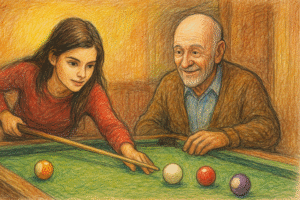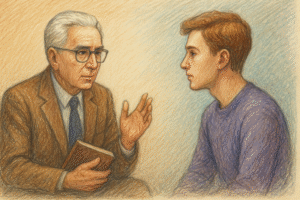Once there was a king who offered a great prize to the artist who could capture perfect peace in a painting. Many artists tried, and the king carefully observed all the paintings. He selected two of them: “only these two really represent perfect peace” he said. However, he had to give the prize to just one of them so he had to choose one.
He started looking more carefully at both paintings. The first was a very peaceful lake. This lake was like a perfect mirror where some tranquil mountains around it were reflected. Above the mountains was a very blue sky with thin white clouds. Everyone who looked at this painting thought that it reflected perfect peace.
The second painting also had mountains. But these were rugged and bare. Above the mountains was a furious sky with thunder clouds and lightning and an ominous downpour of rain. The mountains below seemed to rumble with a torrent of water. This scene was not at all peaceful.
But when the King looked carefully, he saw that behind the waterfall there was a delicate bush growing in a crack in the rock. In this bush there was a nest. There, amidst the roar of the violent waterfall, a little bird sat calmly in its nest. The King finally chose this painting.
Afterwards, he explained the reason for his choice: “Peace does not mean being in a place without noise, without problems, without hard work or without pain. Peace means that despite being in the midst of all these things we are able to remain calm within our hearts.”
The question is how can we be calm in the midst of all these things? The answer is: charity, because as St. Augustine says: “peace is tranquility of order” and St. Thomas, commenting on these words, says that this “tranquility consists in all the appetitive movements in one man being set at rest together.”
Charity is the virtue that allows us to set at rest all of our appetites, because charity is a unifying power. If charity reigns, there is peace, and if charity is despised, peace is despised along with it.
Only charity has the capacity to unify all of our appetites, when we put charity in the first place. Charity makes us love God with all our heart, with all our soul, and with all our strength. That is, it unites all our appetites and desires or makes us subordinate all other desires to this first desire: loving God.
It is impossible that he who truly loves God does not have peace; the lack of peace in this regard would be a sign of some disordered affection, which goes directly against the love of God; the disordered affection cannot coexist with the love of God.





